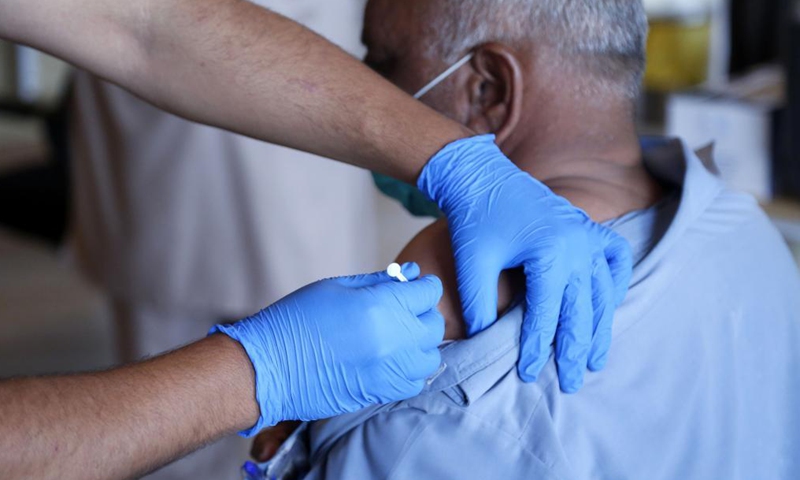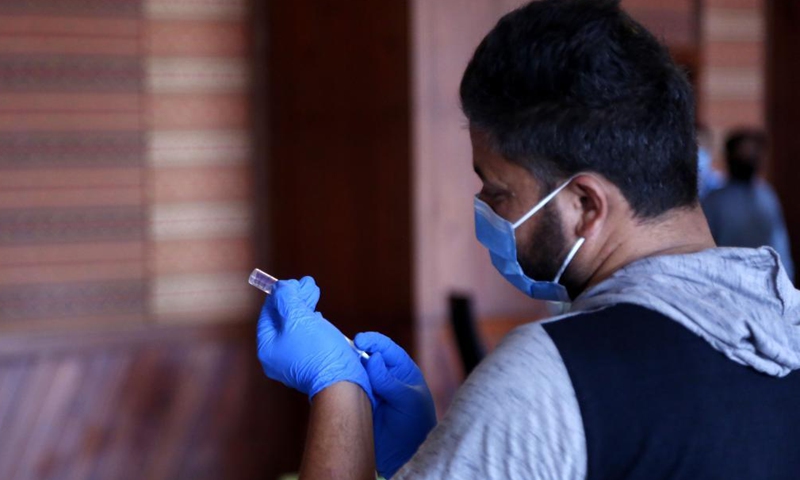
A man receives a dose of Sinovac COVID-19 vaccine at a vaccination center in Islamabad, capital of Pakistan, June 3, 2021. Photo:Xinhua

A medical worker prepares a dose of Sinovac COVID-19 vaccine at a vaccination center in Islamabad, capital of Pakistan, June 3, 2021. Photo:Xinhua
Ghazanfar Malik, his wife and mother recently got immunization certificates after receiving their two jabs of the Chinese Sinopharm COVID-19 vaccine, and besides feeling protected, they felt particularly sad over Malik's father losing his life to the pandemic ahead of his vaccination date three months ago.
"I had mixed feelings when I got my certificate. I kept on thinking that if my father had himself administered the vaccine, he would have been with us today," said Malik.
"He was 70 years old and was the last in his friends' circle to register for the vaccine. Other old men who received Sinopharm shots in time remained safe from the coronavirus, but my old man fell prey to the disease," Malik told Xinhua.
Malik has urged everyone of his friends and acquaintances to get the vaccine to protect themselves and their loved ones from the deadly virus. He believes that vaccination is the most effective tool against the coronavirus epidemic.
Pakistan has recently recovered from a serious third wave of infections and eased anti-epidemic restrictions nationwide after the COVID-19 positivity rate fell below 3 percent. Experts believe speeding up vaccine rollout and making sure people comply with health guidelines have helped the government succeed in curbing the spread of the virus.
The Asian country started its vaccination drive in February this year after receiving vaccines donated by China. With more donations from China as well as the Sinopharm, Sinovac and CanSino vaccines it purchased from China, Pakistan has been immunizing its population from the pandemic.
Asad Umar, head of the National Command and Operation Center (NCOC) against COVID-19, said China came for Pakistan's rescue as a true friend when it was in dire need of the vaccine to immunize its public.
"We were facing a serious challenge and were looking for a friend to come to our rescue, and like always China helped us to overcome the crisis, enabling us to kick off our vaccination drive," said Umar.
Apart from helping Pakistan with vaccine donations, China also enabled Pakistan to roll out locally produced CanSino vaccine through technology transfer, and to be self-sufficient of the vaccine in the future, Umar said.
With the technological support from the CanSino Biologics Inc., the National Institute of Health of Pakistan recently filled and packed the single-dose CanSino vaccine using the bulk vaccine purchased from China. It was the first COVID-19 vaccine manufactured by Pakistan.
Addressing the launching ceremony for the locally produced CanSino vaccine earlier this month, Umar shared results of a local survey, saying that Chinese vaccines are the preferred vaccines due to their superior quality and efficacy.
The vaccine is really a boon for people who have wide interaction with the public on a daily basis, and whose work or business was badly affected by the pandemic, such as transporters, teachers and traders.
Rana Mukhtar, a fruit vendor at a major fruit market located in the capital Islamabad, told Xinhua that his business had suffered six months of market closure and restrictions, including sharp decrease in visitors amid the pandemic, partly as a result of the declining purchasing power of people.
"Things gradually got back to normal when administration of Chinese vaccines started. Many people including myself got a jab. The hustle and bustle of the market has returned and prices of fruit and vegetables at the stalls also dropped, resulting in an increase in the number of customers," Mukhtar said.
M. Ali Kemal, an economic policy advisor at the Ministry of Planning, Development and Special Initiatives, said that the timely vaccination process supported by Chinese vaccines has helped in Pakistan's economic recovery and boosted the government's confidence in easing restrictions following a continuous drop in new cases.
He said that with the momentum in vaccination drive, the socio-economic activities in Pakistan will get a boost.
According to the NCOC, 100 million people out of Pakistan's total population of over 220 million is eligible for vaccination, and the country aims to inoculate them by mid-2022. So far, there have been over 3.5 million fully vaccinated while over 7.2 million partially vaccinated.
Experts and officials believe that China's vaccine donation and uninterrupted vaccine exports have greatly helped Pakistan and many other countries in their combating COVID-19.
In a conversation with Xinhua, Special Assistant to the Prime Minister on Health Faisal Sultan said that the vaccination drive in Pakistan centers around the Chinese vaccines.
He added that China's help in the form of vaccine donations and supplies to countries in need especially the developing countries "underscores the philosophy which the Chinese government put forth, which is that China is doing it for a global good."
